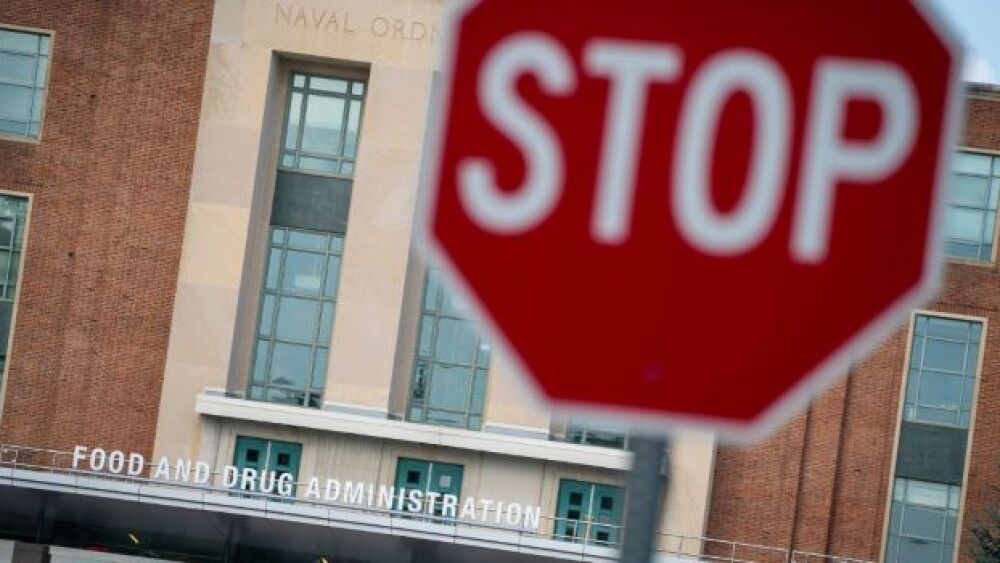The FDA’s Center for Drug Evaluation and Research issued its briefing documents arguing for the market withdrawal of Covis Pharma’s Makena and will discuss the drug on Oct. 17-19.
Sarah Silbiger/Getty Images
The FDA’s Center for Drug Evaluation and Research issued its briefing documents arguing for the market withdrawal of Covis Pharma’s Makena. The agency will discuss the drug on Oct. 17-19.
Makena (hydroxyprogesterone caproate), as well as five generic forms of the drug, is the only drug approved by the FDA to decrease the risk of preterm birth in women with a singleton pregnancy with a history of spontaneous preterm birth. AMAG Pharmaceuticals marketed the drug until Covis acquired it in Oct. 2020.
Specifically, the drug is an injectable progestin therapy to decrease preterm births, or births that occur before 37 weeks of pregnancy have been completed. Preterm babies can develop health issues, including respiratory distress syndrome, neonatal sepsis and intraventricular hemorrhage.
The drug received accelerated approval from the FDA in 2011 based on data from a single clinical study that demonstrated a 42% reduction in the rate of recurrent preterm birth. Under accelerated approval pathways, the company is required to conduct post-marketing studies to verify or prove clinical efficacy, or the drug could be pulled from the market.
In October 2020, the FDA proposed withdrawing the approval. The proposal came after reviewing data collected by Covis over a nine-year period.
In the FDA briefing documents, the agency stated, “Makena has not been shown to improve neonatal outcomes from premature birth, is no longer shown to be effective for its approved use and has known risks. The 1,708-person confirmatory trial designed to verify Makena’s clinical benefit instead failed to show that Makena has any benefit to newborns.”
The FDA also noted that the study did not show that the drug reduced the risk of recurrent preterm birth.
The FDA argues that “there is no basis to retain Makena’s approval but narrow its indicated population to a subgroup of ‘high-risk’ patients, as Covis suggests because the evidence does not show that this — or any — subset of Makena’s indicated population responds more favorably to Makena than any other subset.”
Francesco Tallarico, general counsel at Covis, told BioSpace that the Meis study demonstrated clinical benefit, and the PROLONG trial confirmed Makena’s safety profile.
Tallarico added that more than a decade of post-marketing surveillance led Covis to believe “there is no sound public health reason to deprive access to the only available FDA-approved treatment to reduce the risk of preterm birth in pregnant women with a history of spontaneous preterm birth.”
A recent report issued by the U.S. Department of Health and Human Services Office of Inspector General found that of 278 accelerated approvals from 1992 to 2021, 104 failed to have completed confirmatory trials. Makena was one of four approvals cited in the report as being particularly delayed, about 64 months past the originally planned date.
Tallarico added that “Covis stands ready to discuss data-driven next steps with the Agency to fully explore Makena’s benefits for U.S. patients at high-risk, for preterm birth.” He also looks forward to presenting data to the FDA’s Obstetrics, Reproductive and Urologic Drugs Advisory Committee in October.
Noting that “premature birth is a significant public health concern with unmet medical need,” the FDA argued that the benefit-risk profile of the drug doesn’t support continued approval. The risks include blood clots, which “are unacceptable in light of the lack of evidence of clinical benefit.”
Covis has proposed conducting a prospective, randomized, double-blind, placebo-controlled trial in 1,000 to 3,000 women, primarily in the U.S., with a prior spontaneous preterm birth earlier than 34 weeks. This is a study that the FDA believes would be the only way to “overcome the negative trial result of Trial 003.”
However, Covis proposes keeping Makena on the market while the study is performed. The FDA believes that the availability of the drug makes it less likely for women to enroll in the trial.
The FDA stated that “Even if such a trial could be conducted, it could not be completed in a timely manner. Trial 003 took nearly a decade to complete. A new trial — which, as a practical matter, could occur in the U.S. only if Makena is withdrawn from the market — would likely take at least as long. Retaining Makena’s approval in the interim would mean that a drug indicated to treat a serious condition would likely remain FDA-approved for at least another 10 years, even though the drug has not been shown to be effective.”





